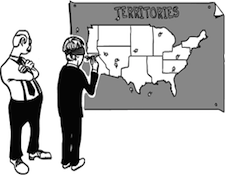It’s the time of year for saving money!
Many years ago, I worked for Eaton Corporation as a regional sales rep. Our division sold industrial power transmission equipment to both distributors and to OEM manufacturers. We had very strict guidelines on who could be a distributor, an OEM (Original Equipment Manufacturer), and the pricing structure extended to both. In no event did we ever sell to the end user on a direct basis. My competition in almost every case exercised the same business practices. It was a system that worked pretty well – then. Today, the lines in many such industries sometimes wind up looking a little blurred. High performance audio is no exception.
 The next, and last in the line of conditions facing audio dealers is where they are allowed to sell and to whom they can sell. One East coast dealer told me he lost a turntable sale to a dealer on the West coast for a customer who was local. The most logical conclusion is the customer visited the local dealer to see the turntable and then started calling dealers nationwide until the best price was found.
The next, and last in the line of conditions facing audio dealers is where they are allowed to sell and to whom they can sell. One East coast dealer told me he lost a turntable sale to a dealer on the West coast for a customer who was local. The most logical conclusion is the customer visited the local dealer to see the turntable and then started calling dealers nationwide until the best price was found.
If you had invested your own personal time and (most importantly) money in establishing a business, would you be enthused with this type of behavior? If you answered no, does the end user not deserve the best price and if one authorized seller is less expensive than another, then is that not the very nature of capitalism? What is the manufacturer’s role in the sale and distribution of their products? Are they in some part responsible for these circumstances?
Some manufacturers keep a fairly tight control on the sale and distribution of their products. I talked with one dealer who told me that a retailer in one Southeast state lost a line because an end user in California sent in a warranty card and the manufacturer traced the serial number. This manufacturer didn’t stand for their sellers engaging in cross-country business and immediately canceled the offending retailer. Other manufacturers set up as many dealers as possible and don’t really care who sells what to whom and in what part of the country. As long as sales are being made, all is fine.
 My feeling is that if I physically visit an audio retailer’s place of business, despite being across the country, I should be able to buy from them without any recriminations on anyone’s part. If I’m doing things strictly by phone, then that might be a shaky limb on the tree. Needless to say, it all depends on the manufacturer and in that there is no uniformity.
My feeling is that if I physically visit an audio retailer’s place of business, despite being across the country, I should be able to buy from them without any recriminations on anyone’s part. If I’m doing things strictly by phone, then that might be a shaky limb on the tree. Needless to say, it all depends on the manufacturer and in that there is no uniformity.
One option is for manufacturers to establish territorial boundaries for sale of their product. But is that really an answer? Would such a policy enable a retailer to remain in business given the number of customers that visit any one dealer in an average year? If a dealer has a good year selling five sets of five figure speakers in a year, are there legitimately sufficient customers to adopt such a strict geographical territory in which to conduct business? If some guidelines are not enacted, how can any fairness and parity in the selling process exist? I don’t mean price controls, those are illegal. Another question might be – is our current methodology so entrenched that a fair, impartial and workable solution just doesn’t exist?
I see one root cause of these problems, and others I encountered, as simply a lack of available customers to make purchases. When you consider the number of consumers buying $5000.00 speakers, as opposed to how many are buying $50,000.00 speakers, compared to how many are buying $50.00 speakers from a big box store, things are put in a little different perspective. As such, those in the business of high performance audio sales must do what they must to remain in business.
Our industry is a hobby borne by disposable income to some, and to others, a means to earn a living and put food on the table. For still others, it is about the passion to build something truly special first, income second. To all it is a desire for remarkable musical reproduction. There are perhaps, not enough clearly delineated lines on how all that may fairly and judiciously be accomplished. Some manufacturers have set rules and guidelines, some don’t. Some regulate who may sell to whom and some simply aren’t concerned. I’ve even had manufacturers tell me that since they don’t have a dealer in the area they would not only sell me direct, but offer me a discount as well.
 In the end, I suppose, once the stereo is set up, plugged in and turned on, all becomes right in the world. Consumers relish their music reproduced and played back with startling effect. Dealers make a sale, hopefully a profit and ultimately a living. Manufacturers sell because they realize sales are required to generate income to fund new products. And I’d be remiss if I didn’t also mention that writers write about it all. And there you have it, our industry in a nutshell. Sometimes exalted, sometimes dubious, sometimes even nefarious. But always sounding really, really good.
In the end, I suppose, once the stereo is set up, plugged in and turned on, all becomes right in the world. Consumers relish their music reproduced and played back with startling effect. Dealers make a sale, hopefully a profit and ultimately a living. Manufacturers sell because they realize sales are required to generate income to fund new products. And I’d be remiss if I didn’t also mention that writers write about it all. And there you have it, our industry in a nutshell. Sometimes exalted, sometimes dubious, sometimes even nefarious. But always sounding really, really good.
Dealers can be a great friend who will always be willing to give advice or help with system improvements – even if it doesn’t mean making a sale. Some will work with their customers on pricing, some won’t. I see them all, with whatever may be perceived as flaws or fair business practices, as a valuable part of our industry. One I hope flourishes and continues to work with audio consumers to find their own particular sound.
I told several dealers who I was and what I was doing and they had something they wanted me to pass along. They told me they were simply self-employed business people making a living doing something they love. Part idealistic; part opportunistic, and always willing to help their customer find the sound they seek.
Happy Listening.





